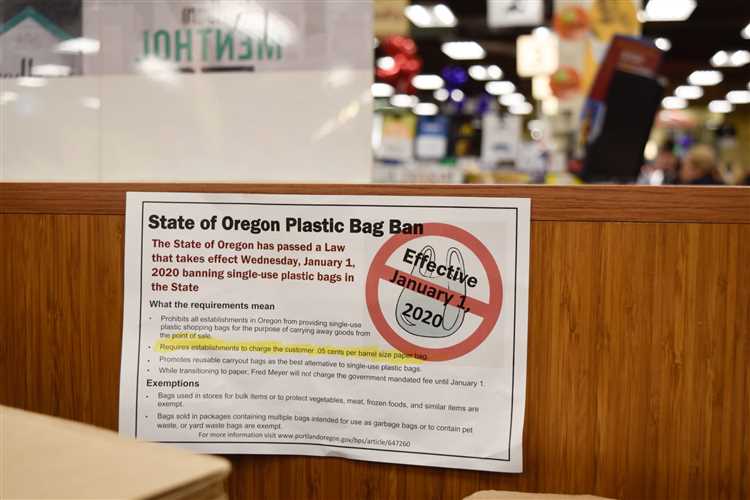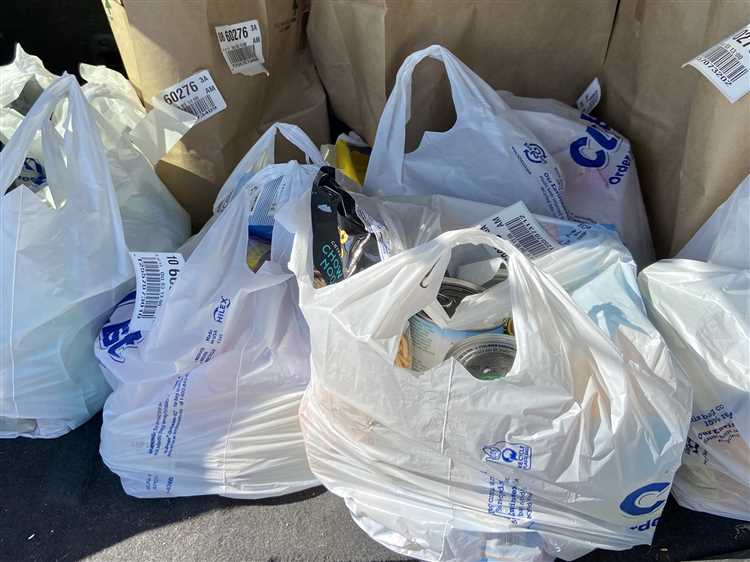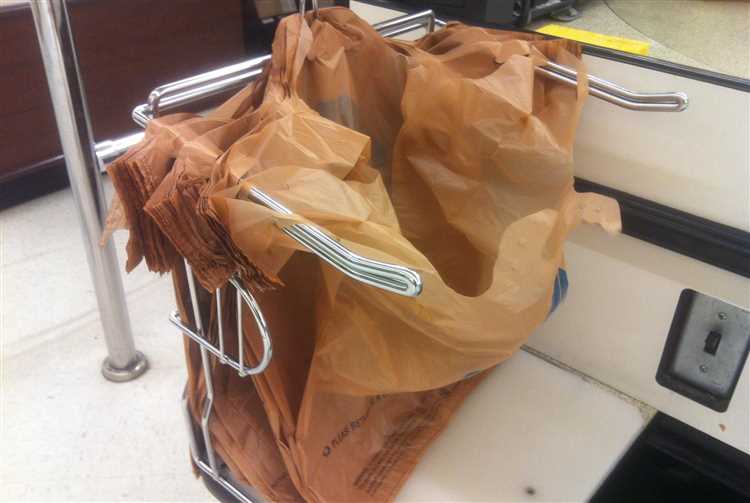Oregon has recently implemented a charge for paper bags at grocery stores, sparking controversy and debate among residents and environmentalists. While some may question the need for this charge, it is imperative to understand the reasons behind it and the potential benefits it can bring.
Protecting the Environment: One of the main reasons behind Oregon’s charge for paper bags is to protect the environment. Paper bags are made from trees, and their production contributes to deforestation and habitat destruction. By imposing a charge, the aim is to encourage consumers to bring their own reusable bags or opt for more sustainable alternatives like cloth bags.
Changing Consumer Habits: Another reason for the charge is to change consumer habits and promote more sustainable practices. By making customers pay for paper bags, it prompts them to think twice about their choices and encourages them to adopt eco-friendly alternatives. This small monetary inconvenience can lead to significant behavioral changes and a greater commitment to reducing waste.
Funding Conservation Programs: The revenue generated from the charge for paper bags can be used to fund conservation programs and initiatives. These funds can be directed towards preserving forests, promoting recycling and waste reduction, and educating the public about sustainable practices. By linking the charge to environmental causes, it creates a sense of responsibility and investment in protecting the planet.
In conclusion, Oregon’s charge for paper bags serves a twofold purpose – protecting the environment and promoting sustainable consumer behavior. By understanding the reasons behind this charge, residents can see the potential benefits it can bring and the positive impact it can have on the state’s conservation efforts.
- Understanding the Environmental Impact of Paper Bags
- 1. Resource Consumption
- 2. Waste Generation
- The Origins of Oregon’s Charge for Paper Bags
- The Economic Rationale for the Paper Bag Fee
- Environmental Impact
- Cost of Waste Management
- The Effects of the Paper Bag Charge on Consumer Behavior
- Environmental Impact
- Economic Impact
- Question-answer:
- Why is Oregon charging for paper bags?
- How much is Oregon charging for paper bags?
- Are there any exemptions to the paper bag charge in Oregon?
- What is the purpose of the charge on paper bags?
- Is the paper bag charge in Oregon effective?
Understanding the Environmental Impact of Paper Bags
While paper bags may seem like a more eco-friendly alternative to plastic bags, they still have their own environmental impact. It is important to understand this impact in order to make informed choices about the use and disposal of paper bags.
1. Resource Consumption
The production of paper bags requires the use of trees, water, and energy. Trees are cut down to produce the pulp needed for the bags, contributing to deforestation. The process also consumes large amounts of water and energy, leading to potential resource depletion and increased greenhouse gas emissions.
2. Waste Generation
Although paper bags are biodegradable and can be recycled, a significant percentage still ends up in landfills. When paper bags decompose in landfills, they produce methane, a potent greenhouse gas that contributes to climate change. Additionally, the recycling process requires energy and resources, making it a less sustainable solution.
Despite these environmental impacts, paper bags are often seen as a better option compared to plastic bags because they can be recycled and biodegrade more readily. However, it is important to note that the best solution is to reduce the use of single-use bags overall and opt for reusable alternatives whenever possible.
| Environmental Impact | Description |
|---|---|
| Resource Consumption | The production process uses trees, water, and energy, contributing to deforestation and potential resource depletion. |
| Waste Generation | Despite being biodegradable and recyclable, a significant percentage of paper bags still end up in landfills, contributing to methane emissions. |
The Origins of Oregon’s Charge for Paper Bags
As concerns about the environmental impact of single-use products have grown, many states and cities have implemented policies to reduce plastic bag usage. Oregon is one such state that has taken measures to address this issue.
The charge for paper bags in Oregon can be traced back to the state’s efforts to reduce waste and promote sustainability. In 2011, the Oregon Legislature passed Senate Bill 536, which aimed to encourage the use of reusable bags and reduce the consumption of single-use bags.
Under this legislation, retailers in Oregon were required to charge customers at least five cents for each single-use bag, including paper bags. The objective was to incentivize customers to bring their own reusable bags instead of relying on single-use options.
By implementing this charge for paper bags, Oregon hoped to reduce the consumption of these single-use items and promote a shift towards more sustainable alternatives. The aim was to inspire individuals to think more consciously about their consumption habits and make choices that would have a positive impact on the environment.
The charge for paper bags has had a notable effect in Oregon. According to a study by the Oregon Department of Environmental Quality, the number of single-use bags used in the state decreased by approximately 50% in the first year after the legislation was implemented.
Overall, the charge for paper bags in Oregon originated from the state’s commitment to waste reduction and sustainability. By encouraging the use of reusable bags and discouraging the consumption of single-use options, Oregon’s policy aims to create a more environmentally-conscious and responsible society.
The Economic Rationale for the Paper Bag Fee
In recent years, many municipalities have implemented a fee for single-use paper bags, including the state of Oregon. While some may view this fee as an inconvenience or an unnecessary burden, there are economic reasons behind its implementation.
Environmental Impact

One of the primary motivations for the implementation of the paper bag fee is to reduce the environmental impact of single-use bags. Paper bags require a significant amount of resources to produce, including trees and water. Additionally, the production and disposal of paper bags contribute to deforestation and greenhouse gas emissions. By charging a fee for paper bags, consumers are incentivized to bring their own reusable bags, leading to a reduction in overall paper bag usage and its associated environmental impact.
Cost of Waste Management

Another economic rationale for the paper bag fee is the cost of waste management. Paper bags, like other single-use items, contribute to the growing problem of waste disposal. Local municipalities are responsible for managing and disposing of this waste, which can be costly. By charging a fee for paper bags, municipalities are able to offset some of these costs and allocate resources more efficiently. The revenue generated from the fee can be allocated towards waste management programs, recycling initiatives, or other environmentally friendly projects.
Furthermore, the paper bag fee can also encourage consumers to adopt more sustainable shopping habits. By charging a fee for paper bags, consumers are prompted to think twice before accepting a bag at the checkout counter. This behavior change can lead to a reduction in overall waste generation and a shift towards more sustainable alternatives, such as reusable bags.
In conclusion, the implementation of a fee for single-use paper bags in Oregon serves various economic purposes. It aims to reduce the environmental impact of paper bag usage, offset the cost of waste management, and encourage consumers to adopt more sustainable shopping habits. While the fee may initially be seen as a burden, it ultimately contributes to a more environmentally conscious and economically sustainable future.
The Effects of the Paper Bag Charge on Consumer Behavior

The implementation of a paper bag charge in Oregon has had a significant impact on consumer behavior. This charge, which requires consumers to pay a fee for each paper bag they use at grocery stores and other retailers, was designed to encourage the use of reusable bags and reduce the consumption of single-use paper bags.
One of the most noticeable effects of the paper bag charge is the increase in the use of reusable bags. Many consumers have made the switch from disposable paper bags to reusable bags in an effort to avoid paying the extra fee. This has led to a decrease in the demand for paper bags and a corresponding increase in the demand for reusable bags.
Another effect of the paper bag charge is a significant decrease in the overall consumption of paper bags. Prior to the implementation of the charge, many consumers would use paper bags without much thought, as they were provided free of charge. However, with the introduction of the fee, consumers have become more conscious of their bag usage and have started to opt for alternative options such as reusable bags or simply carrying their purchases without a bag. This has resulted in a significant reduction in the number of paper bags being used.
Environmental Impact
The reduction in paper bag consumption as a result of the charge has had a positive environmental impact. Paper bags are made from trees, and the production of paper bags contributes to deforestation and the release of greenhouse gases. By reducing the demand for paper bags, the paper bag charge has helped to preserve forests and reduce carbon emissions.
Additionally, the increased use of reusable bags has further reduced the environmental impact of shopping. Reusable bags can be used many times before needing to be replaced, which reduces the need for additional bag production and the disposal of single-use bags. This leads to a decrease in waste and a more sustainable shopping experience.
Economic Impact

The paper bag charge has also had economic implications. The fee collected for each paper bag provides an additional source of revenue for retailers, which can help offset the costs of implementing environmentally-friendly practices. Additionally, the increased demand for reusable bags has led to the growth of this industry, creating new jobs and economic opportunities.
| Positive Effects | Negative Effects |
|---|---|
| – Reduction in paper bag consumption | – Additional cost for consumers |
| – Increase in the use of reusable bags | – Initial resistance to change |
| – Positive environmental impact | – Decrease in paper bag production |
| – Economic benefits for retailers | – Potential decrease in overall sales |
In conclusion, the paper bag charge in Oregon has resulted in significant changes in consumer behavior. Consumers have shifted towards using reusable bags and have reduced their consumption of paper bags. This has had positive environmental effects and created economic opportunities. However, it is important to consider the potential negative effects, such as the extra cost for consumers and the initial resistance to change.
Question-answer:
Why is Oregon charging for paper bags?
Oregon is charging for paper bags in order to reduce waste and encourage the use of reusable bags. The charge on paper bags is intended to incentivize consumers to bring their own bags when they go shopping.
How much is Oregon charging for paper bags?
Oregon is charging 5 cents per paper bag.
Are there any exemptions to the paper bag charge in Oregon?
Yes, there are exemptions to the paper bag charge in Oregon. Certain types of paper bags, such as those used for meat, bulk goods, and prescription drugs, are exempt from the charge. Additionally, individuals using SNAP benefits to purchase groceries are also exempt.
What is the purpose of the charge on paper bags?
The purpose of the charge on paper bags is to encourage consumers to use reusable bags and reduce waste. By placing a financial cost on paper bags, it aims to incentivize individuals to bring their own bags when shopping.
Is the paper bag charge in Oregon effective?
There is evidence to suggest that the paper bag charge in Oregon is effective. Since the implementation of the charge, there has been a significant reduction in the use of paper bags and an increase in the use of reusable bags. This indicates that the charge is successfully influencing consumer behavior.